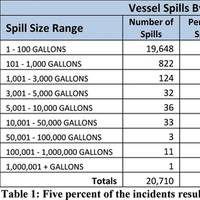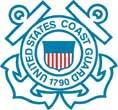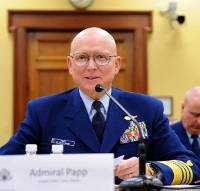Rodriguez Appointed Interim Director of MITAGS

The Maritime Institute of Technology and Graduate Studies (MITAGS) announced it has appointed Mike Rodriguez as interim director."I am pleased that Mike Rodriguez has agreed to take on the day-to-day administration of MITAGS' academic programs and courses as we begin the process of bringing onboard a new director,” said Eric Friend, MITAGS executive director. “Mike brings a wide range of experience and skills to our crew as we move our organization forward.”“I have been fortunate throughout my career to work with great people in education, labor, government and the military.
OMB - Subchapter M Cleared for Publication
The Office of Management and Budget (OMB) completed its review of the draft final rule entitled Inspection of Towing Vessels, also known as "Subchapter M." The document has been returned to the Department of Homeland Security (DHS) and the US Coast Guard for final preparation prior to promulgation in the Federal Register. According to the U.S. Coast Guard, this rulemaking would implement a program of inspection for certification of towing vessels, which were previously uninspected. It would prescribe standards for safety management systems and third-party auditors and surveyors, along with standards for construction, operation, vessel systems, safety equipment, and recordkeeping.
Shore Leave: Re-think on Balancing Security, Seafarer Rights

Before port states became hyper-sensitive to security issues, shore leave was natural part of a seafarer’s life. You worked long and hard hours at sea, often for extended periods of time on long voyages. When the ship reached port, you went ashore and decompressed, connecting with family and friends. That and much more changed after the terrorist attacks of 11 September 2001. The IMO adopted the International Ship and Port Facility Security (ISPS) Code mandating enhanced security onboard vessels subject to the SOLAS Convention.
USCG Proposes New Rules for Maritime Facilities Access
Notice of proposed rulemaking by U.S. On Monday, the U.S. Federal Register published a notice of proposed rulemaking by the U.S. Coast Guard (USCG) to implement section 811 of the Coast Guard Authorization Act of 2010 (Pub. L. 111-281) which would provide clear regulatory requirements for each facility owner or operator to provide seafarers associated with a vessel moored at the facility, and other individuals, access between the vessel and facility gate without unreasonable delay, and at no cost to the seafarer or other individual. Generally, transiting through a facility is the only way that a seafarer or other individual can egress to shore beyond the facility to access basic shoreside businesses and services…
Offshore Supply Vessels: The U.S. Can Compete
After all, the industry was created in America ... it is only appropriate that the United States dominate it again. Offshore supply vessels (OSVs), also known as platform supply vessels (PSVs), have been a distinct vessel type since 1956, when the MV Ebb Tide was placed into service in the Gulf of Mexico. Ebb Tide was designed by Alden J. “Doc” Laborde to meet the growing demand for vessels to service the increasing number of offshore oil drilling rigs in those waters. Previously, this new industry had been served, albeit inadequately, by existing vessels, particularly surplus amphibious assault barges. Ebb Tide was designed with the pilot house at the bow and with an open deck from there aft to the stern.
Reducing Human Error & Near Miss Incidents

We recently came across a very interesting report issued to Congress by the United States Coast Guard. The May 2012 study might seem dated, but that’s hardly the case. Actually, it’s a telling description of what can go wrong, why and perhaps, a blueprint for how to go forward and fix things. That’s our take, in any event. The Report chronicles oil spills from all vessel types, including the towing industry, tank ships, the offshore industry, freighters, and fishing vessels. Section…
USCG Issues Interim OSV Cargo Rule
The U.S. Coast Guard (USCG) issued an interim rule regarding regulations to mitigate the risk created by the removal of the statutory size limit previously placed on offshore supply vessels (OSVs). The regulations were effective immediately upon publication in the Federal Register. The Coast Guard Authorization Act of 2010 removed the statutory size limit previously placed on offshore supply vessels and required the Coast Guard to issue regulations to mitigate the risk created as a result, noting the need to ensure safe carriage of oil, hazardous substances and individuals other than crew on OSVs of at least 6,000 gross tonnage as measured under the Convention Measurement System.
USCG Double Hull Tanker Rule Published
The U.S. Coast Guard (USCG) final rule on escort requirements for certain tankers operating on the waters of Prince William Sound, Alaska, was published Friday in the Federal Register. This rule finalizes the escort requirements in Title 33, Code of Federal Regulations, Part CFR 168, which were previously published as an interim rule Aug. 19, 2013. This final rule mandates two tug escorts for double hull tankers of more than 5,000 gross tons, transporting oil in bulk in Prince William Sound. A double hull provides vessels with added protection from an oil spill resulting from a hull breach due to a grounding, allision or collision. While double hull tank vessels provide greater protection from oil spills compared to single hull tank vessels…
OMB - review of draft OSV rule
The Coast Guard Authorization Act of 2010 removed the size limit on offshore supply vessels (OSVs). The Act also directed the Coast Guard to issue, as soon as is practicable, a regulation to implement section 617 of the Act and to ensure the safe carriage of oil, hazardous substances, and individuals in addition to the crew on vessels of at least 6,000 gross tonnage as measured under the International Convention on Tonnage Measurement of Ships (6,000 GT ITC). Accordingly, the Coast Guard's rule will address design, manning, carriage of personnel, and related topics for OSVs of at least 6,000 GT ITC. This rulemaking will meet the requirements of the Act and will support the Coast Guard's mission of marine safety, security, and stewardship.
USCG Accepting Applications for TSAC Vacancies

The United States Coast Guard is requesting applications from qualified candidates seeking consideration for appointment as public members to the Towing Safety Advisory Committee (TSAC). TSAC advises the Coast Guard on matters relating to shallow-draft inland and coastal waterway navigation and towing safety. Applications for TSAC membership must include a cover letter and resume. By mail: Alternate Designated Federal Official (ADFO)of TSAC, Commandant, (CG-OES-2)/TSAC U.S. Coast Guard, 2100 Second St. By e-mail to [email protected].
US Coast Guard Fishing Vessel Safety Examinations Now in Force
USCG's mandatory commercial fishing vessel safety examinations for those operating more than three miles from the territorial sea baseline take effect. This requirement, which affects commercial fishing fleets nationwide, comes as a result of Congress' passing of the Coast Guard Authorization Act of 2010. To help fishermen come into compliance with the regulations that apply to their vessel, the Coast Guard has built an on-line commercial fishing vessel "checklist generator" available here. This tool will help owners and operators to understand their specific equipment and operational requirements and the checklist can be used to examine the vessel and prepare for the Coast Guard visit.
U.S. Coast Guard Focus on Commercial Fishing Boat Safety
The Coast Guard urges commercial fishing vessel operators to undergo mandatory safety examinations prior to enforcement of new regulations. All commercial fishing, fish tender and fish processing vessels that operate or transit more than three nautical miles offshore must demonstrate full compliance with fishing industry vessel safety regulations during a mandatory safety examination. To demonstrate compliance with this new regulation, fishermen are encouraged to contact Coast Guard fishing vessel examiners to obtain a Commercial Fishing Vessel Safety Decal. The examination requirement is one of several new mandates established by the Coast Guard Authorization Act of 2010.
USCG Eases TWIC Requirements
The Coast Guard announced the publication of a policy letter that exempts a number of mariners from the requirement to obtain a Transportation Worker Identification Credential when renewing or obtaining a Coast Guard-issued merchant mariner credential. The policy letter provides immediate relief for mariners who otherwise would need to obtain a TWIC to get or renew their Merchant Mariner Credential. The policy letter also provides the Coast Guard with an expedient means to comply with a portion of the requirements set forth in Section 809 of the Coast Guard Authorization Act of 2010. “These changes eliminate the TWIC requirement for…
Coast Guard Commandant Testifies on Appropriations

U.S. Coast Guard Commandant Adm. Bob Papp testified before the House Subcommittee on Homeland Security Appropriations here, Thursday, about the Coast Guard’s budget for fiscal year 2012. Adm. Papp spoke about the service's fiscal year 2012 budget request and provided committee members a snapshot of recent Coast Guard operations including vessel traffic management on the St. Marys River in Michigan, anti-piracy operations in the Gulf of Aden, the rescue of workers from an oil platform fire in the Gulf of Mexico…
Passenger Vessel Market Update

MarineNews spoke with industry experts to get an overview of the passenger vessel market as it stands today, including a legislative update and business leaders’ insights on pricing, ridership and vessel construction and renovation. Actions in Congress this year provided a mixed bag for passenger vessel operators. Because of the new tax law, private operators will be able to take advantage of an immediate 100% depreciation deduction for capital investments made in 2011. Also,…
Coast Guard Authorization Act of 2010
On Friday, October 15, President Obama signed into law the Coast Guard Authorization Act of 2010 (H.R. 3619). This is the first such authorization act for the Coast Guard since 2006. The statute is lengthy (128 pages) and addresses a wide variety of maritime issues. This article will attempt to identify those provisions expected to have the most impact or of the most interest. I have grouped these provisions into broad categories, although there is some natural overlap. The Coast Guard is provided specific authority to enforce the U.S. coastwise trade laws and its personnel are to be trained with regard to these laws. This provision is somewhat redundant, in that the agency, since its founding as the Revenue Cutter Service in 1790, has had this authority.
AWO Hails New Deadlines for Towing Vessel Inspection Regs
The American Waterways Operators (AWO), the national trade association for the tugboat, towboat and barge industry, hails the enactment of provisions in the Coast Guard Authorization Act of 2010 (P.L. 111-281) that bring the industry one step closer to a historic towing vessel inspection regulation to improve safety in the towing industry. Section 701 of the Act requires the U.S. Department of Homeland Security (DHS) “to issue a notice of proposed rulemaking regarding inspection requirements for towing vessels” no more than 90 days from the date of enactment, a provision strongly advocated by AWO. The law requires that a final rule be issued no more than one year after the enactment date.
USCG Implements Authorization Act
Admiral Bob Papp, Commandant, US Coast Guard issued ALCOAST 507/10, explaining in part how he intends to implement the recently-signed Coast Guard Authorization Act of 2010. Even though the new law does not require continuation of the Atlantic and Pacific Area Commands, he will retain these positions. The Chief of Staff will become the Deputy Commandant for Mission Support (DCMS). The position of Deputy Commandant for Operations (DCO) will become a Vice Admiral billet. (10/15/10). (Source: Bryant’s Maritime News)
Coast Guard Authorization Bill Signed into Law
A new law that improves maritime safety, improves living conditions for Coast Guard members, assists the ongoing replacement of the service’s aging fleet and bolsters maritime and port security was signed into law Friday by President Barack Obama. "The Coast Guard Authorization Act of 2010 provides us with authority to enhance the safety of U.S. ports and waterways, acquisition assistance to acquire state-of-the-art ships and aircraft to patrol America's waters, and tools to promote individual readiness, including improvements to our family housing and child development centers," said Adm. Bob Papp, commandant, U.S. • Policies that will support the execution of the maritime safety and security missions.
Cummings on Coast Guard Authorization Bill
Congressman Elijah E. Cummings (MD-07), Chairman of the House Subcommittee on Coast Guard and Maritime Transportation, was pleased with the passage of H.Res. 1665, concurring in Senate amendments to H.R. 3619, the Coast Guard Authorization Act of 2010. The bill authorizes slightly more than $10b in annual funding for the United States Coast Guard, and will make several major changes to the service. Cummings chaired four hearings on the Deepwater acquisition program and participated in multiple hearings of the full Transportation and Infrastructure Committee to consider Coast Guard acquisitions. Coast Guard procurement was heavily examined, including circumstances leading to initial failures in Deepwater procurements.
Bill Amended to Address PVA Concerns
On Tuesday, November 17, 2009, the U.S. House of Representatives approved the Cruise Vessel Security and Safety Act of 2009, sponsored by Representative Doris Matsui of California (H.R. 3360). The vote was 416-4. The House also included this legislation as title IX of the Coast Guard Authorization Act of 2010. The legislation addresses crime against and safety risks to passengers on large oceangoing cruise ships. Over the past few years, there has been substantial publicity about crimes committed against American passengers on international cruise ships. Other instances have involved passengers who have disappeared overboard. As introduced…
Cummings Assists Passage of USCG Funding Bill
Congressman Elijah E. Cummings assisted in the U.S. House of Representatives passing of H.R. 3619, the “Coast Guard Authorization Act of 2010.” Congressman Cummings was “floor manager” for the bill. Cummings, Chairman of the Subcommittee on Coast Guard and Maritime Transportation, also sponsored the bill. The Coast Guard authorization, which passed 385-11, will allow the Coast Guard to add 1,500 additional personnel, bringing the total number of authorized service members to 47,000. Also, the number of authorized officer slots will increase to 6,700. “This authorization will hopefully allow the Coast Guard to shed their tradition of doing more with less,” said Congressman Cummings.












